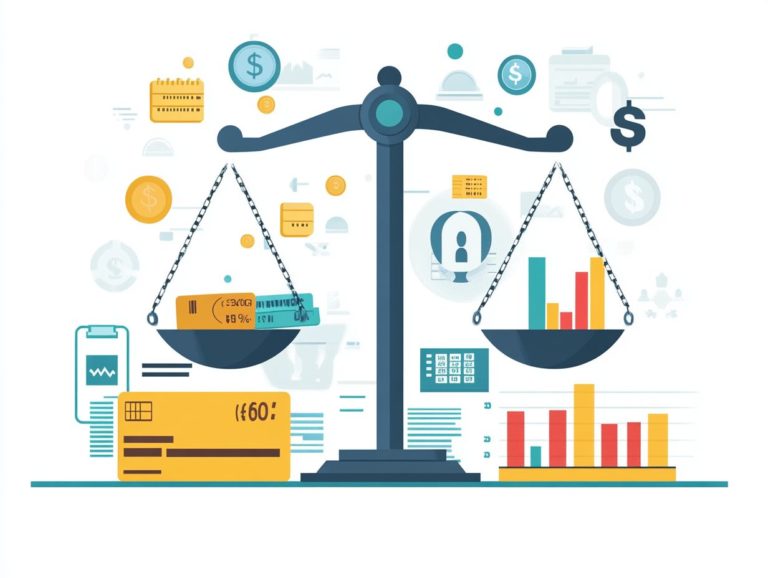The Impact of Divorce on Your Credit Score
Divorce can be an emotionally taxing experience. It’s easy to overlook its potential impact on your financial health, especially your credit score.
Understanding what a credit score is and the factors that influence it is crucial during such a significant life change. This article delves into the connection between divorce and credit scores. We highlight how joint accounts can complicate matters while providing practical steps to protect and rebuild your credit.
With the right strategies and resources, you can emerge from this challenging chapter with a stronger financial future.
Contents
- Key Takeaways:
- Understanding Credit Scores
- The Link Between Divorce and Credit Scores
- Protecting Your Credit During Divorce
- Rebuilding Your Credit After Divorce
- Seeking Professional Help
- Frequently Asked Questions
- How does divorce affect my credit score?
- Can my ex-spouse’s credit score affect mine?
- What happens to joint accounts after a divorce?
- Will my credit score be affected if I keep my ex-spouse’s debt?
- How can I protect my credit during a divorce?
- Can I remove my ex-spouse’s name from a joint account after a divorce?
Key Takeaways:

- Divorce can have a major impact on your credit score, leading to missed payments, increased debt, and changes in how much credit you re using.
- Joint accounts can affect both parties’ credit scores, so it’s crucial to close or transfer these accounts during divorce.
- Protect your credit by monitoring your report, communicating with lenders, and creating a budget.
Understanding Credit Scores
Understanding credit scores is essential for anyone managing financial responsibilities, particularly during major life transitions such as divorce. Your credit score reflects your creditworthiness and plays a critical role in your ability to obtain loans, credit cards, and mortgages.
Key elements like your payment history and how much credit you’re using compared to your limits significantly influence this score. Credit scoring models, such as VantageScore and those developed by companies like Experian, take these various factors into account to assess your credit health.
This assessment can greatly affect your financial future.
What is a Credit Score?
A credit score is essentially your numerical badge of creditworthiness. It is carefully derived from your credit history and outlined in your credit report. This score is pivotal in determining the terms and availability of loans, credit cards, and even rental agreements.
Several key factors contribute to how this score is calculated:
- Payment history
- Amounts owed
- Length of credit history
- Types of credit in use
- Recent credit inquiries
For many, maintaining a solid credit score is crucial for securing favorable loan interest rates and navigating financial waters smoothly. A robust credit history showcases your on-time payments and responsible credit usage. This helps you obtain necessary financing and cultivate trust with lenders and financial institutions.
Factors that Affect Credit Scores
Several key factors influence your credit score, including payment history, how much credit you’re using compared to your limits, and the frequency of credit inquiries. Understanding these elements is essential for effectively managing your financial health.
Your payment history, which constitutes a significant portion of your credit score, reflects how reliably you’ve met your financial obligations over time. A consistent record of on-time payments can notably elevate your score.
How much credit you’re using compared to your limits is another crucial factor. Keeping your utilization rates low showcases responsible borrowing behavior, which can further enhance your score.
Frequent credit inquiries might signal potential financial overextension. It’s wise to be mindful of how often you seek new credit, as this can temporarily lower your scores. Together, these factors paint a comprehensive picture of your creditworthiness.
The Link Between Divorce and Credit Scores
The relationship between divorce and credit scores is intricate and frequently underestimated. A divorce can profoundly reshape your financial landscape and credit health.
As you navigate the divorce process, you’ll encounter various financial obligations think division of assets, debts, and responsibilities tied to joint accounts. A shift in marital status can influence your credit score, especially if one spouse neglects their obligations. This could lead to late payments or delinquencies that tarnish your credit report.
Grasping these dynamics is vital for crafting a sound financial strategy in the aftermath of divorce.
How Divorce Can Impact Credit Scores

Divorce can significantly impact your credit score. This often happens when financial obligations are unclear, leading to missed payments and negative entries on your credit report.
Dividing shared debts can become complicated when couples separate. If one party neglects to make timely payments on joint accounts, both individuals may find their credit reports affected, regardless of whose name appears on the account.
Unexpected financial challenges, such as ongoing alimony or child support obligations, can further complicate matters and strain personal finances. This situation often creates a ripple effect, where missed payments can decrease your credit score.
It s essential to understand how to manage credit after a divorce. This knowledge is crucial for maintaining your financial health moving forward.
Joint Accounts and Credit Scores
Joint accounts can intricately complicate credit scores during a divorce. Both parties often continue to share financial responsibilities until a marital settlement agreement is finalized.
This shared financial landscape can lead to unexpected repercussions on individual credit scores, particularly if one party falls behind on payments. The intertwining of finances highlights the necessity of maintaining financial separation during such a tumultuous time.
To safeguard your individual credit standing, it’s crucial to develop effective strategies for managing joint debt. Techniques like creating a dedicated budget or establishing a clear agreement on how each party will handle outstanding balances can significantly mitigate negative impacts.
By taking these proactive steps, you ensure a smoother transition into financial independence post-divorce.
Protecting Your Credit During Divorce
Protecting your credit during divorce is vital for your future! Take charge and implement strategies like credit monitoring today to stay informed about any changes to your credit report and safeguard against identity theft.
Establish clear payment deadlines and consider a credit freeze to navigate this challenging time without unwelcome financial surprises.
Steps to Take to Safeguard Your Credit
To safeguard your credit during a divorce, there are several proactive steps you can take. Consider utilizing credit monitoring services, implementing a credit freeze, and managing late payments effectively.
By adopting these strategies, you can navigate this challenging period with enhanced financial security. Initiating a credit freeze is particularly crucial, as it prevents any unauthorized access to your credit reports, stopping new accounts from being opened in your name.
Utilizing credit monitoring services offers you real-time alerts about any changes, allowing you to spot identity theft early on. Managing late payments is equally vital; consistently making on-time payments can significantly influence your credit scores, helping to maintain financial relationships even amidst personal upheaval.
Together, these actions contribute to a healthier credit profile, equipping you with the necessary tools to rebuild and maintain your credit standing.
Rebuilding Your Credit After Divorce
Rebuilding your credit after a divorce is essential! With the right financial plan and focus, you can enhance your credit health.
After dealing with the complexities that come with divorce, you may find your credit scores compromised due to shared debts and missed payments. It s vital to take proactive measures establishing individual accounts, managing your credit utilization wisely, and tackling any lingering financial obligations.
These steps are essential in restoring your credit score and setting the foundation for a more secure financial future.
Strategies for Improving Your Credit Score

Ready to boost your credit score after a divorce? Let s explore some powerful strategies! Improving your credit score after a divorce demands a keen focus on effective credit-building strategies. Prioritize timely payments and responsible credit utilization, and manage your debts effectively to pave your way forward.
Managing finances can be tough as you strive to reclaim control over your financial future. It s vital to establish a budget that prioritizes your monthly expenses, ensuring that bills are paid punctually. Consider utilizing automated payment options; they can serve as excellent reminders to help you consistently meet those deadlines.
Managing your credit utilization is crucial. Aim to keep it below 30% of your available credit. Thoughtful management of existing debts, whether through consolidating loans or negotiating payment plans, can significantly enhance your credit profile over time.
Seeking Professional Help
Seeking professional assistance through credit counseling can provide you with invaluable support in managing the financial challenges that often accompany and follow a divorce. Credit counselors offer expert guidance on money management, helping you navigate your credit history, develop budgets, and establish smart ways to use credit for the future. This consumer education is particularly vital if you re considering personal loans or dealing with complex debt responsibilities.
Credit Counseling and Other Resources
Credit counseling and other financial resources are crucial in helping you regain control over your financial obligations and elevate your credit score. These services help simplify financial management that can feel overwhelming at times.
By assessing your unique situation, credit counselors can develop tailored strategies for budgeting, debt reduction, and effective credit usage. They often provide educational materials that simplify credit reports and scores, empowering you to track your progress with confidence.
Knowing where to seek assistance is essential; organizations like the National Foundation for Credit Counseling offer invaluable insights and workshops that enhance financial literacy, ultimately paving the way for a more secure financial future.
Frequently Asked Questions
Here are some common questions about credit and divorce.
How does divorce affect my credit score?
Divorce does not directly impact your credit score, as credit scores are individual and not tied to marital status. However, the financial decisions made during and after a divorce can indirectly affect your credit score.
Can my ex-spouse’s credit score affect mine?

No, your ex-spouse’s credit score will not affect yours. However, if you have joint accounts or shared debt, their actions can impact your credit score.
What happens to joint accounts after a divorce?
Joint accounts are typically closed or transferred to individual accounts during a divorce. This means that both parties are responsible for paying off any remaining balance on the joint account.
Will my credit score be affected if I keep my ex-spouse’s debt?
If you have joint debt with your ex-spouse and choose to keep that debt after the divorce, it can affect your credit score if they miss payments or default on the debt. It’s important to consider the potential impact on your credit before making this decision.
How can I protect my credit during a divorce?
One way to protect your credit during a divorce is to close all joint accounts and transfer them to individual accounts. You may also want to monitor your credit report regularly to ensure that all joint accounts are closed and there are no unexpected changes.
Can I remove my ex-spouse’s name from a joint account after a divorce?
Yes, you can remove your ex-spouse’s name from a joint account after a divorce by refinancing the loan or transferring the account to an individual one. However, this may require approval from the lender and could impact your credit score.






